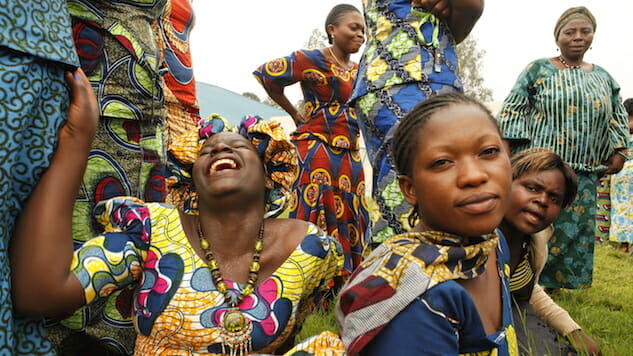Netflix’s Piercing Documentary City of Joy Is a Profound Example of the Power of Compassion
Photo: Paula J. Allen/Netflix TV Reviews City of Joy
It’s a fairly obvious metaphor, but for all that it’s still shocking to see it play out. The “violation” of land for its resources (gold, tin, tungsten, coltan, diamonds—the so-called “conflict minerals”). The mass rape and disfigurement of women by basically enslaved militias. The collapse of a society.
In the city of Bukavu, in the eastern Democratic Republic of Congo, near the Rwandan border, the population has swelled from about 250,000 people to around a million in just a few years, as villages in the farming and mining lands to the west have become ghost towns. It goes like this: Militias swarm in, commit massacre, mass rape and other atrocities, and the survivors flee for their lives, leaving the mines unattended. Riches are extracted and sold. By whom, to whom?
Well, I have some bad news about your wedding ring, your computer, your car, your cell phone.
Factions of the Congolese government and those of neighboring countries like Rwanda and Uganda also benefit from the ongoing conflict, but the ripple effect is worldwide. Meanwhile, women are being raped and tortured en masse. It’s been going on for decades, and if you’re wondering why it hasn’t been stopped or why you don’t hear about it constantly, you’re not alone. Survivors of this human rights nightmare are also wondering why no one is stepping in.
Netflix’s new documentary, Madeleine Gavin’s City of Joy, follows activist Christine Schuler Deschryver and OB-GYN Dr. Denis Mukwege on a journey to help victims of sexual violence reclaim and rebuild lives that are often utterly shattered by it (in addition to the physical brutalization and unwanted pregnancies, rape victims are often shunned by spouses or other surviving family members). City of Joy is a compound within the city of Bukavu—part sanctuary, part health center, part dojo—where women stay for six months and focus on healing from physical and psychological trauma. Along the way, they are cared for, given camaraderie, taught skills (including self-defense), and encouraged to become comfortable with their bodies and their stories. Playwright Eve Ensler joins in with writing exercises (aided by translators and stumbling along bravely in bad French) and group talk therapy. What happens to these women in a few short months is genuinely incredible. Their stories are harrowing. The physical and psychic damage most of them have endured is jaw-dropping, and the resiliency they display even more so. Schuler Deschryver and Mukwege give warm-hearted, cool-headed, intelligent and direct voices to this crisis, and the women interviewed are astonishing in their displays of humor, courage and tenacity.
City of Joy is a piercing little film, by turns appalling and uplifting, that manages to go straight to the heart of a complex issue and contend with it eloquently, bravely, and concisely. It’s firmly in the “you need to know about this” category. Both at a geopolitical level, because it is not a crisis you’re going to find getting a lot of play in U.S. news media and it really is shocking to see what’s going on behind the scenes—your corporate and government corruption conspiracy theories will be calmly, coolly and thoroughly validated—and at a much more personal level, because it is crucial to understand how much can be done to heal people who have endured horrific experiences. This film will show you a deeply needed example of the power of compassion and support even in the face of the unimaginable.
City of Joy is now streaming on Netflix.
Amy Glynn is a poet, essayist and fiction writer who really likes that you can multi-task by reviewing television and glasses of Cabernet simultaneously. She lives in the San Francisco Bay Area.